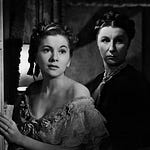When I thought to join everyone in ranking the books I read in 2021, my list reminded me that Maurice was among my favorites1. E.M. Forster’s novel of homosexual love in Edwardian England, which was not published until after his death in 1970, is notable and unique for its happy ending, on which the great author refused to compromise. Forster’s “posthumous novel of gay life,” as Alexander Chee describes it in one of last year’s standout essays, follows the eponymous homosexual in his desperate struggle against the “unspeakable vice of the Greeks.”
In its attention to detail, Forster’s portrait of a young man’s developmental trajectory from innocent to lover is as painstaking as the removal of orthodontia, and yet as joyous as public sex. When he meets Clive, the agent of his first heartbreak, Maurice spends the night pacing the lawns of Cambridge, “his heart glowing.” Though the following morning, and for the next few years, he will compartmentalize his desires from his gender, race, and class obligations, Maurice’s “heart had lit never to be quenched again, and one thing in him at last was real.”
This flame stands him in good stead in conflicted Clive’s kissless purgatory, in the physician’s hostile exam room, in the hypnotist’s sterile oblivion: Maurice goes on to find Alec, the upper-class Clive’s groundskeeper, and Alec finds him, in return. “He knew what the call was, and what his answer must be. They must live outside class, without relations or money; they must work and stick to each other till death. But England belonged to them. That, besides companionship, was their reward. Her air and sky were theirs, not the timorous millions’ who own stuffy little boxes, but never their own souls.”
The publication of Maurice was a coda: as text, with its articulation of the unspeakable (including that for which Forster, personally, could have gone to prison); and beyond, with an afterword contextualizing the author’s creative decisions: “I was determined that in fiction anyway two men should fall in love and remain in it for the ever and ever that fiction allows, and in this sense Maurice and Alec still roam the greenwood.” As real as their world feels to me—who among us has not had to choose between our souls and a closet-case?—Maurice the modern novel concludes as fairytale, with the two lovers disappearing into an England where “it was still possible to get lost,” as the author writes. Following two world wars, “the wildness of our island…was stamped upon and built over and patrolled in no time. There is no forest or fell to escape to today.”
Though Maurice and Alec get their happy ending, modernity keeps on its inevitable grind, in a process of attrition rather than progress. “We had not realized that what the public really loathes in homosexuality is not the thing itself but having to think about it,” Forster wrote in 1960. The ruling class would maintain control through, in part, the criminalization of free sexuality: “Clive on the bench will continue to sentence Alec in the dock. Maurice may get off.” Though we must be suspicious of our separatist impulses—which, uninterrogated, replicate those same hegemonic structures we wish to flee—Maurice and Alec’s alternative to assimilation, even if imaginary, is what saves Maurice from obsolescence, even here, even now.
I’ve begun 2022 with another novel about (homo)sexual outlaws. Lucy & Mickey, American author Red Jordan Arobateau’s “butch trip through life before Stonewall” is worlds away from Maurice in subject matter (impoverished butch/femme dykes hustling to survive in late-1950s Chicago), style, perspective, and reception. But it shares with Maurice an insistence on pleasure as truth, as real, though for queers it can only take place outside of real life.
In opposition to that real life, to the nuclear family, straight jobs, white supremacy, and the cages of foster care, mental ward, and prison, Lucy & Mickey’s main characters live the Life, the extralegal existence relegated to the poor, the drug-using, the sex-working, the gay and transvestite, the black, brown, and indigenous. So long as Arobateau’s protagonist, teen butch dyke Mickey, chooses the Life over straightness, she will never really be a citizen, fighting to survive the great apathy of “the shops and factories that didn’t want to hire her. Restaurants and bars that didn’t want to serve her,” and the more targeted threat of the police state.
But together with Lucy, the femme she meets while turning a trick to save herself from starvation, Mickey can find her own greenwood, steal “a piece out of this insane world with its trade & its freaks.”
“It’s a dangerous world out there. Dangerous to the heart,” Mickey thinks to herself. Like Maurice’s flame, the heat of her lust keeps her warm, if not safe.
David tweets at @k8bushofficial. Preorder their second novel, X (Catapult, 2022), here.
Subscribe to support GOOD ADVICE/BAD GAY, an advice series from an anonymous gay therapist who’s not afraid to hurt your feelings with the truth. (Sample an unlocked post for a taste of what you’re missing.) 100% of funds go to support a rotating selection of mutual aid and reparations projects.
Want advice? Email badgayadvice@gmail.com for a free 3-month subscription.
It was one of three Forsters I read last year, alongside Where Angels Fear to Tread (biting but homey) and Aspects of the Novel (trippy as fuck).












